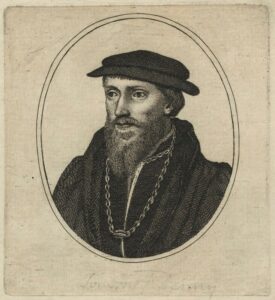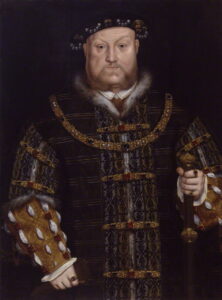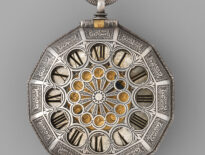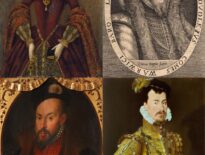 Sir Anthony Denny was born on this day in Tudor history, the 16th January 1501, in the reign of King Henry VII, at Cheshunt in Hertfordshire. He was the second son of Sir Edmund Denny, Baron of the Exchequer to Henry VIII, and his wife, Mary Troutbeck.
Sir Anthony Denny was born on this day in Tudor history, the 16th January 1501, in the reign of King Henry VII, at Cheshunt in Hertfordshire. He was the second son of Sir Edmund Denny, Baron of the Exchequer to Henry VIII, and his wife, Mary Troutbeck.
Denny was educated at St Paul’s School, London, before moving on to St John’s College, Cambridge.
Following employment in the service of Sir Francis Bryan, a man known as the “Vicar of Hell”, By 1533, he’d secured a place in Henry VIII’s inner sanctum—the privy chamber—a realm reserved for the king’s most trusted men, and he was made a yeoman of the wardrobe in 1536. He rose to become keeper of the privy purse in 1542 and then in 1546, first chief gentleman of the privy chamber and groom of the stool. Groom of the Stool may sound like a disgusting job to us, as it involved helping the king with his toilet habits, but it also meant intimate access to the king and influence over royal decisions. In 1540, following the king’s doomed marriage to Anne of Cleves, Denny was one of those in whom the king confided his unhappiness in the marriage.
Denny benefited from the dissolution of the monasteries by being granted land and properties including the abbeys of Waltham and St Albans, and the priories of Cheshunt and Hertford.
Denny was married to Joan Champernowne. Joan came from a family deeply connected to the Tudor court. Her sister, Katherine Ashley, would go on to become a key figure in Elizabeth I’s life, shaping the future queen’s education and faith. Both Denny and his wife were keen Protestants. Joan served as a lady to Anne of Cleves and Catherine Parr, and was one of those ladies at court the Catholic Conservatives hoped that Protestant martyr Anne Askew would implicate in 1546.
 In the king’s final years, Denny was one of the few entrusted with the royal dry stamp—a tool that gave him the power to sign documents on the king’s behalf, a power that could shape the realm without the king ever lifting a pen. In January 1547, the once-mighty King Henry VIII lay on his deathbed, his body failing after years of excess and injury. It was Anthony Denny who was summoned to deliver the ultimate truth—a truth no one dared speak, telling Henry VIII “to prepare himself to death... and to call upon God... for grace and mercy”. Denny was an executor of Henry VIII’s will and at his funeral procession, with Sir William Herbert, was “set at the head and feet of the said corpse”.
In the king’s final years, Denny was one of the few entrusted with the royal dry stamp—a tool that gave him the power to sign documents on the king’s behalf, a power that could shape the realm without the king ever lifting a pen. In January 1547, the once-mighty King Henry VIII lay on his deathbed, his body failing after years of excess and injury. It was Anthony Denny who was summoned to deliver the ultimate truth—a truth no one dared speak, telling Henry VIII “to prepare himself to death... and to call upon God... for grace and mercy”. Denny was an executor of Henry VIII’s will and at his funeral procession, with Sir William Herbert, was “set at the head and feet of the said corpse”.
In June 1548, after the dowager queen, Catherine Parr, had found her husband, Thomas Seymour, in an embrace with her stepdaughter, Elizabeth, the future Elizabeth I, Elizabeth was sent to live with Denny and his wife, Joan, at their home in Cheshunt to protect the princess’s reputation and Catherine’s marriage.
In Edward VI’s reign, Denny was sent with the Marquess of Northampton to put down Kett’s Rebellion in the summer of 1549, but died at Cheshunt on 10th September 1549. He was survived by five sons and four daughters, and an illegitimate son. In his will, he left instructions for his wife Joan to educate their children to that “the commonwealth may find them profitable members and not burdens as idle drones be to the hive”.
His grandson, Edward Denny, 1st Earl of Norwich, son of Denny’s eldest son and heir, Henry, served Elizabeth I as a groom of the privy chamber and married a granddaughter of William Cecil, Baron Burghley. He was created Earl of Norwich in 1626.



Leave a Reply